If the future is all about building mechanical mobility, whether on wheels or robotic legs, auto parts suppliers have a competitive edge. “We believe humanoid robots will bring a third wave of growth for auto parts suppliers,” Morgan Stanley analysts said in a June 18 report. The authors include lead autos analyst Adam Jonas, industrial analyst Sheng Zhong and hardware technology analyst Andy Meng. The team upgraded two self-described Chinese Tesla suppliers and maintained a rating of overweight on another given expectations the companies can benefit from the coming rise of humanoids. This would be similar to how auto parts suppliers got a boost from the growth of electric cars and subsequently growth in “smart” cars with driver-assist capabilities. One of the parts companies, Sanhua , is scheduled to list in Hong Kong on Monday in addition to its current listing on mainland China’s Shenzhen exchange. Already, at least two automakers — Tesla and Xpeng — are developing humanoid robots. Other car companies such as Zeekr and Volkswagen have teased how they’re trying out humanoids at their factories. Auto suppliers “have the chance” to capture 47% to 60% of spending on parts and materials, according to Morgan Stanley estimates. In dollar terms, auto parts suppliers can account for around $15,000, or 60%, of each humanoid’s production cost, the firm’s report said. Other humanoid components such as screws and bearings aren’t commonly used in cars, making machinery companies better poised to supply them, the report said. By 2050, Morgan Stanley predicts the humanoid market will be worth $800 billion in China and $5 trillion worldwide. As it’s still early days, the analysts prefer “tier-1” module assemblers such as Sanhua since they “can secure assembly orders no matter which tech path is chosen.” That’s in contrast with “tier-2” component makers such as lidar or chip producers. A trio of sector picks Here are Morgan Stanley’s three sector picks, all currently traded in mainland China: Tuopu — The firm issued a price target of 63 yuan, for upside of nearly 39% from Friday’s close. Tuopu makes actuators, which enable mechanical movement in a car , and act as joints and muscles in humanoids. Morgan Stanley trimmed its price target on Tuopu due to softer Tesla orders, but maintained its overweight rating. The analysts expect Tuopu can supply humanoid actuator models as well as dexterous hand models for the robots. Actuator modules account for just under half of a humanoid’s total cost, but even when incorporating a price drop, the total addressable market for the modules worldwide is likely to grow by 57% on an annual basis through 2030, Morgan Stanley predicts. “Such a material value composition offers revenue upside to Sanhua and Tuopu,” the analysts said. Sanhua — The firm assigned a price target of 30 yuan, reflecting 20% upside from Friday’s close. Morgan Stanley upgraded Sanhua to overweight from equal weight, and the firm raised the price target mildly on stronger-than-expected 2025 revenue and expectations for rising electric vehicle penetration worldwide. “We estimate that every 10ppt of global market share in humanoid actuator modules by 2030E would bring incremental revenue to Sanhua equal to 11% of 2024 total revenue,” the analysts said. “To mitigate geopolitical risk, Sanhua has been setting up a plant in Thailand, and it expects to start production there from 3Q25.” Xusheng — The firm gave the stock a price target of 12 yuan. Shares closed at 12.08 yuan on Friday. Morgan Stanley upgraded the stock to equal weight from underweight on expectations Xusheng’s revenue will “recover modestly” as startup automaker Li Auto launches more battery-only electric cars. However, the analysts cautioned that Xusheng may see lower-than-expected revenue from Tesla and other customers. In terms of humanoids, Xusheng can supply casting and torso structural parts, the analysts said. It’s still not fully clear how easy it is for the auto parts suppliers to directly shift to making humanoid parts. There are many questions about how quickly and how large the industry of human-like robots will become. The analysts also cautioned that despite Chinese humanoid parts suppliers’ cost advantage over overseas peers, U.S.-China tensions could force businesses to choose more expensive alternatives.
https://www.cnbc.com/2025/06/22/china-car-suppliers-can-be-early-winners-in-humanoid-race-morgan-stanley.html


